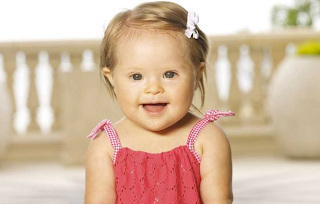Meet Valentina Guerrero, a 10-month-old from Miami who's modeling for the Dolores Cortés Kids USA swimwear catalogue. She even walked the runway (oh, OK, she got carried). Adorable, right? "People with Down syndrome are just as beautiful and deserve the same opportunities," designer Dolores Cortés told Adweek.
Meanwhile, there's been rumbling online about whether Valentina was chosen to be the face of the brand's kiddie ads because she has Down syndrome. The headline on the The Huffington Post's Facebook page:
Writer S.E. Smith at XOJane went off on Cortés for reportedly issuing a press release about Valentina and putting the tot on the runway. While progress is being made, this writer noted, she decried what she called companies' "persistent insistence upon being recognized for using disabled models" rather than "subtly integrating them into catalogs and advertisements and letting them be seen for who they are." She felt companies are trying to call attention to their "progressiveness."
Let's take a closer look at these claims:
The claim: Companies are "trumpeting" it when they feature kids with special needs in ads and demanding "praise and pats on the back."
Reality check! Target has cast kids with Down syndrome in ads for the last few years, including the adorable Ryan Langston. Word about this spread largely via social media. Target, if anything, has been remarkably closed-mouthed about Ryan.
Only after a Washington Post writer contacted Target about Ryan did the company issue a statement: "Target is committed to diversity and inclusion in every aspect of our business, including our advertising campaigns. Target has included people with disabilities in our advertising for many years and will continue to feature people that represent the diversity of communities across the country."
Nordstrom also featured Ryan, in its anniversary catalog. Again, the company didn't draw attention to it. Neither company seems to have demanded praise or props for their choice of models.
The claim: Companies are trying to prove they're "progressive" by featuring kids with special needs in ads.
Reality check! Well, yes, this is progressive—as hard as that is to believe in 2012. As much as parents of kids with disabilities may long to see them represented in the media (and generally get treated like other kids), the fact is very, very few children with special needs are featured in mainstream print ads and catalogs. And TV ads? Name one; I can't.
Reality check! True, some companies are eager to have models and spokespeople who get them attention. But this isn't Snooki doing an ad for a weight-loss pill. This is a child worthy of being a model—beautiful, smiley, chuba-licious and anything you'd ever want in a baby swimsuit model. Valentina, Adweek notes, is the first child with Down syndrome to be the "main" model for a fashion company. Let's talk about a star being born, not "exploitation."
The claim: It's wrong to announce that you have featured a child with Down syndrome, rather than "just subtly integrating them into catalogs and advertisements."
Reality check! OK, my first instinct also was it's wrong for a company to get all self-promotional about this. But then I thought it through, and I've decided that if a company chooses to make a big deal out of featuring a child with Down syndrome in their ads it can be a Good Thing. For one, it can help spark conversation about inclusion. Also, the more attention models like Valentina get, the more likely it is that other companies will join in—and the more it has a chance of becoming a "norm." We are so, so far away from that right now.
Reality check! Why the assumption that this beautiful child won't stay beautiful? Are only cutie-pie babies with Down syndrome model material, to this writer? Maybe Valentina will continue to land modeling contracts for her good looks, charm and popularity, if that's what her parents want. Maybe she will give Gisele a run for her money. Who knows what the future holds.
I want to see more, more, more kids with Down syndrome in ads. I want to see children with cerebral palsy, like Max, and other disabilities as well. If this becomes a trend then, yippppeeee! And if other companies rush to jump on that trend, well, how awesome would that be?
Images: Thomas Bollinger Photography











